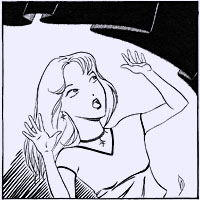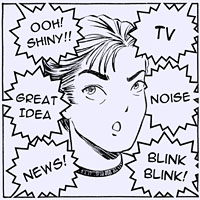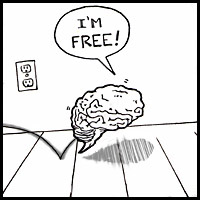"Saying NO to Suicide"
Part 1 | Part 2
 Some people have asked me how I manage depression without medication. Please keep in mind that medication is not the answer for everybody. Some people either can't afford medications or are hypersensitive to them, which is the case with me. I can't take any medication without worrying about side effects. So today let's get down and dirty. This will be a little lengthy, but I'll list ten steps I might take on any particular day to shake off the black beastie. My challenge today is to make you smile about depression. I may have just conceded defeat with that last sentence, but I'll make the attempt anyway. Since anybody can make up a list and put it on the web, let's make this real. I'll take an actual bout of depression and chart how I dealt with it.
Some people have asked me how I manage depression without medication. Please keep in mind that medication is not the answer for everybody. Some people either can't afford medications or are hypersensitive to them, which is the case with me. I can't take any medication without worrying about side effects. So today let's get down and dirty. This will be a little lengthy, but I'll list ten steps I might take on any particular day to shake off the black beastie. My challenge today is to make you smile about depression. I may have just conceded defeat with that last sentence, but I'll make the attempt anyway. Since anybody can make up a list and put it on the web, let's make this real. I'll take an actual bout of depression and chart how I dealt with it.It is 5:30pm and I hear the lilting voice of my wife as she comes home. Instead of happiness I have an instantaneous sense of panic. I had forgotten to pay the power bill, something she had asked me to do. In fact, I hadn't remembered it at all until I heard her voice. Instead, I had been struggling all day to resuscitate my poor PDA which my four year old had taken out of commission.That was enough to get me depressed. I don't call my PDA "my brain" for kicks. It is vital to my daily productivity. However, with my wife's arrival I compounded my frustration and funk with a healthy dose of failure.
My wife nimbly phoned the payment in and saved the day but I was feeling a hundred pounds of stupid on my head. That's when I began to realize I had slipped into depression. It is one thing to feel disappointment with oneself, and another to be let down by events around you, but it's quite another to want to crawl into a hole and disappear. Here's where we begin:
1) It is easier to stave off depression before it happens than after it lays over you like a heavy wool blanket.
I missed this step this time around. I let myself become stressed over the PDA, but depression isn't always something that can be avoided. Sometimes, our mind just decides to move in that direction and take us along for the ride. Still, it is important to recognize your warning signs so you can reverse direction when you can. If depression is merely a chemical imbalance then theoretically one should be able to change that balance back to something more healthy. Meds attempt to do this, but attitude can help us do this as well. Barring some of your own, I suppose you could always drink a can of Moxie instead.
2) You need to know when you are depressed.
I know. I know. Advice like this sounds lame on the surface.
"People Need Air to Breathe! Details at 11."
Step two is simple advice, but crucial to stopping depression dead in its tracks. In my experience many people who suffer from depression often don't fully realize they are Depressed. They are too busy feeling miserable and overwhelmed to futz about with labels and self-diagnosis. Once I recognize that I am Depressed, however, I help myself realize that these feelings are alien and chemically induced. They are not Me. Realizing that, I can summon the strength to give them an eviction notice.
3) Ask yourself, "Do I have a reason to be depressed?"
If the answer is "No", then it's time to take back your life. Being sad for no reason is no fun and should be avoided like summer camps with Al Qaida. If the answer is "Yes", then you need to determine if what you are feeling is appropriate to the situation. If you've lost a loved one, for instance, there is a good reason to feel sad. If you are overwhelmed because you missed your favorite TV program, the depression might be taking things slightly out of proportion.
4) Develop the desire to not be depressed.
So you have a seven sheet long list of reasons why you are depressed and you think they're all really good ones. You may not realize it, but your perspective is a bit skewed.
If you suffer from depression you know how hard it is to shake it off. Heck, it can be hard enough breathing, nevermind summoning strength to get perky. But you need to set your mind to not let depression get the best of you. The process is called mind over mood by some, learned optimism by others. I was able to develop this skill on my own, mostly because I was an ornery cuss tired of being depressed all the time, but some people enjoy the help of a Cognitive Behavior Therapist or Psychologist to help them develop it.
These first four steps help you change from being a victim to being in control. I spent the better part of a decade learning how to do it on my own, but there are many resources available now for people with depression. There is no reason to go it alone. In the next column I'll cover the remainder of this list with six ways to distract yourself from being depressed. In the meantime, work on your self-analysis. It's a lot less expensive than visiting a psychiatrist and asking him or her how you are feeling that day.

 This week was going to be a departure from my usual
This week was going to be a departure from my usual  Last week's column didn't strike a chord in as many people as others I've written. I can only think that is a
Last week's column didn't strike a chord in as many people as others I've written. I can only think that is a